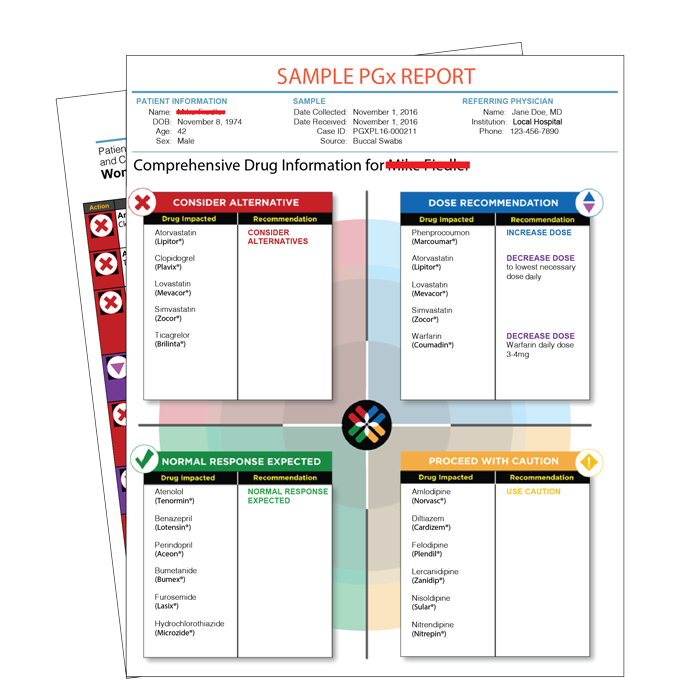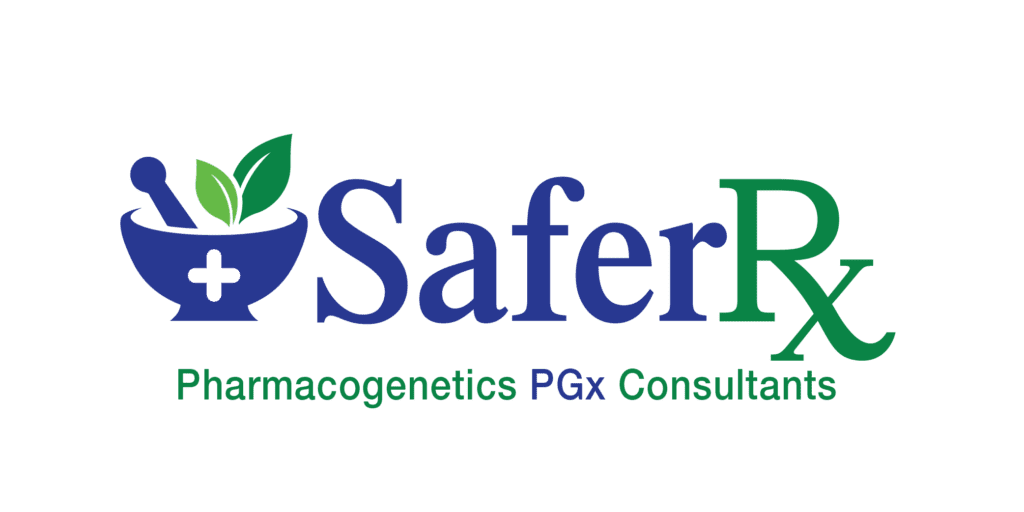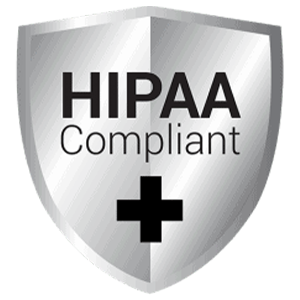
STOP Adverse Drug Reactions From
Taking Their Toll on Your Practice
…and Your PATIENTS!
The Right Drug
The Right Dose
Right From The Start

Covered by Medicare and Medicaid*
Pharmacogenomics: A Pre-emptive Tool For Effective Medication Management
Genetics account for 20-95 percent of the variability in drug disposition and effects. Aided by pharmacogenomic (PGx) testing, doctors can quickly determine which medications may not work for a patient based on their DNA.
This information allows them to individualize a patient’s medication plan according to their genetic makeup, thereby reducing adverse reactions, minimizing variations in treatment outcomes, and enhancing resource utilization while reducing costs.
Fast Facts
- PGx testing helps maintain CMS compliance while dramatically improving patient care, and overall satisfaction, at no extra cost for the doctor or patients.
- An estimated 128,000 Americans die every year and 2 million more are hospitalized because of taking their medication as prescribed and directed.1
- Vanderbilt studied 9,500 heart patients and found that 91 percent had at least one gene that would prompt doctors to recommend a change in the dose of medication.2
- According to the FDA, more than 75 percent of people have genetic variations that affect how they respond to the most commonly prescribed medications.3. As a result, as much as 50% of prescribed drugs can be ineffective.4
- ADRs increase ER admissions by as much as 42% and 30-day hospital readmissions by up to a staggering 52%.5
- Roughly 50 percent of hospital patients are prescribed a drug in any one-year period that could cause serious side effects because of their genetic makeup. This means that ADRs and their associated cost are largely a preventive problem.6
- Given the astronomical cost and number of deaths, ER visits, hospitalizations, and suffering attributed to preventable ADRs it’s astonishing that most doctors continue to practice a “trial-and-error” approach to prescribing drugs.
1U.S. News and World Report – Sept 27th, 2015. 2Scientific American. 3FDA – Center for Education Research – NIH-National Institutes of Health & AMA.
4Slone Epidemiology Center. 5John Nelson, MD., former president of AMA. 6St. Jude and Vanderbilt Medical Centers.
The Safer, Humane, More Profitable Solution
Medicare, Medicaid* and many commercial insurance providers will cover a Pharmacogenetic (PGx) test to reduce the risk of adverse drug reactions and the anguish and cost they cause.
With the help of this cutting-edge technology, understanding the intricate connections between DNA and medication treatment options has never been easier.
With a simple cheek swab, physicians can now determine if a medication is more likely to help or harm a patient before prescribing the drug.
This not only saves doctors money and staff time but also reduces the undue pain and suffering for their patients caused by preventable Adverse Drug Reactions (ADRs).
*Medicaid in approved states

Not All Pharmacogenetic (PGx) Test Are Created Equal
It is essential to mention that most labs focus on only a limited number of drugs, genes, and variants, so many physicians have never been exposed to
an efficacious test. This has led to some hesitation among doctors in implementing PGx tests.
An efficacious PGx tests utilizes Next Generation Sequencing (NGS) assay to provide clinically actionable information for medications across a broad
range of medical fields, including anesthesiology, cardiology, endocrinology, gastroenterology, gynecology, immunology, infectious diseases,
neurology, oncology, pain management, psychiatry, respiratory, rheumatology, toxicology, urology, and more.
The test also yields results for drug-drug, drug-food, drug-alcohol, and drug-lab interactions.
*Typically, test results take about ten days, so preemptive testing is highly recommended so the results
are readily available in a medical emergency or before trying a new drug.

Benefits of PGx and Personalized Medicine
More Informed Prescribing Decisions
Saves Time
Saves Money
Reduces ER Visits
Reduces Hospital Readmissions
Reduces Mortality Rates
Reduces Pain & Suffering
Enhances Safety Measures
Achieve Therapeutic Benefits Sooner
Lifetime Utility

Covered by Medicare and Medicaid*
*Medicaid in approved States
Financial Cost and Consequences of
“Trial and Error” Prescribing
Real People- Real Cases - Real Proof - Real Cost

Marion W.
Marion was PGx tested in April 2019. Based on the results, her doctor advised her to stop taking the Metoprolol, which she had been taking for years, and decreased the dosage of her HBP medications. Two years later, her pain management doctor ignored her PGx report and prescribed 300 mg of Tramadol, which caused a life-threatening ADR, and she was hospitalized for three days. If her doctor had adhered to the PGx report guidelines, all the expense and suffering could have been avoided.

Mike F.
Mike was having difficulty sleeping, so his doctor prescribed Escitalopram. After five weeks of undesirable side effects and no relief, he had a PGx test and learned he was a rapid metabolizer of Escitalopram. If he had been preemptively PGx tested, it would have saved him and his insurance company money and Mike time by avoiding a useless trip to the pharmacy to purchase an ineffective drug. More importantly, he would have received relief weeks sooner.

Dorothy J.
Dorothy was experiencing a piercing headache, so she went to the ER. They gave her Reglan 5mg, IV push once, and Toradol 15 mg. A few days later, she had stroke-like symptoms, so her doctor ordered an MRI. Several months later, she had a PGx test and discovered that she was a slow metabolizer of Toradol. If she had a preemptive PGx test, it could have saved her insurance carrier thousands of dollars and spared her the distress and anguish caused by a preventable ADR.



